- Home
- David Gemmell
Legend Page 4
Legend Read online
Page 4
He pushed his aching body upright, stretching the tight muscles of his back. “Too much time in Drenan in soft beds,” he commented.
“That probably accounts for the paunch,” she noted.
“Paunch? I’ve a curved spine. Anyway, it’s relaxed muscle.” He looked down. “All right, it’s a paunch. A few more days of this and it will go.”
“I don’t doubt it,” she said. “Anyway, we were lucky to find this place.”
“Yes, we were.” The conversation died as she turned the bacon. Rek was uncomfortable in the silence, and they began to speak at the same time.
“This is ridiculous,” she said finally.
“Yes,” he agreed. “Bacon smells good.”
“Look … I want to thank you. There—it’s said.”
“It was a pleasure. What about starting again, as if we had never met? My name is Rek.” He held out a hand.
“Virae,” she said, grasping his wrist in the warrior’s grip.
“My pleasure,” he said. “And what brings you to Graven Forest, Virae?”
“None of your damned business,” she snapped.
“I thought we were starting afresh,” he said.
“I’m sorry. Really! Look, it’s not easy being friendly—I don’t like you very much.”
“How can you say that? We’ve only said about ten words to each other. A bit early for character assessment, isn’t it?”
“I know your kind,” she said. Taking two platters, she deftly flipped the bacon from the pan and handed him a plate. “Arrogant. Think you’re the gods’ gift to the world. Footloose.”
“And what’s wrong with that?” he asked. “Nobody’s perfect. I enjoy my life; it’s the only one I’ve got.”
“It’s people like you who have wrecked this country,” she told him. “People who don’t care, people who live for today. The greedy and the selfish. We used to be great.”
“Rubbish. We used to be warriors, conquering everybody, stamping Drenai rules on the world. A pox on it!”
“There was nothing wrong with that! The people we conquered prospered, didn’t they? We built schools, hospitals, roads. We encouraged trade and gave the world Drenai law.”
“Then you shouldn’t be too upset,” he told her, “that the world is changing. Now it will be Nadir law. The only reason the Drenai conquered was that the outlying nations had had their day. They were fat and lazy, full of selfish, greedy people who didn’t care. All nations fall that way.”
“Oh, so you’re a philosopher, are you?” she said. “Well, I consider your opinions to be as worthless as you are.”
“Oh, now I’m worthless? What do you know of ‘worthless,’ prancing around dressed as a man? You’re an imitation warrior. If you’re so eager to uphold Drenai values, why don’t you get off to Dros Delnoch with the other fools and wave your pretty little sword at the Nadir?”
“I’ve just come from there, and I’m going back as soon as I have accomplished what I set out to do,” she said icily.
“Then you’re an idiot,” he said lamely.
“You were a soldier, weren’t you?” she said.
“What’s that to you?”
“Why did you leave the army?”
“None of your damned business.” He paused, then, to break the awkward silence, went on: “We should be at Glen Frenae by this afternoon; it’s only a small village, but they do sell horses.”
They finished their meal without speaking, Rek feeling angry and uncomfortable yet lacking the skill to pierce the gap between them. She cleared the platters and cleaned out the pan, awkward in her mail shirt.
Virae was furious with herself. She had not meant to quarrel with him. For hours as he slept she had crept about the cabin so as not to disturb him. At first when she woke she had been angry and embarrassed by what he had done, but she knew enough about frostbite and exposure to realize he had saved her life. And he had not taken advantage. If he had done so, she would have killed him without regret or hesitation. She had studied him as he slept. In a strange way he was handsome, she thought, then decided that although he was good-looking after a fashion, it was some indefinable quality that made him attractive—a gentleness, perhaps? A certain sensitivity? It was hard to pinpoint.
Why should he be so attractive? It angered her; she had no time now for romance. Then a bitter thought struck her: She had never had time for romance. Or was it that romance had never had time for her? She was clumsy as a woman, unsure of herself in the company of men, unless in combat or comradeship. His words came again in her mind: “What do you know of ‘worthless,’ prancing around dressed as a man?”
Twice he had saved her life. Why had she said she disliked him? Because she was frightened?
She heard him walk from the hut and then heard a strange voice.
“Regnak, my dear! Is it true you have a woman inside?”
She reached for her sword.
4
The abbot placed his hands on the head of the young albino kneeling before him and closed his eyes. He spoke, mind to mind, in the manner of the order.
“Are you prepared?”
“How can I tell?” answered the albino.
“Release your mind to me,” said the abbot. The young man relaxed his control; the image of the abbot’s kindly face overlapped his thoughts. His thoughts swam, interweaving with the memories of the older man. The abbot’s powerful personality covered his own like a comforting blanket, and he slept.
Release was painful, and his fears returned as the abbot woke him. Once again he was Serbitar, and his thoughts were his own.
“Am I prepared?” he asked.
“You will be. The messenger comes.”
“Is he worthy?”
“Judge for yourself. Follow me to Graven.”
Their spirits soared, entwined, high above the monastery, free as the winter wind. Below them lay the snow-covered fields at the edge of the forest. The abbot pulsed them onward, over the trees. In a clearing by a crofter’s hut stood a group of men facing a doorway in which stood a tall young man, and behind him was a woman, sword in hand.
“Which is the messenger?” asked the albino.
“Observe,” answered the abbot.
Reinard had not had things going his way just recently. An attack on a caravan had been beaten off with heavy losses, and then three more of his men had been found dead at dusk, among them his brother Erlik. A prisoner he had taken two days previously had died of fright long before the real entertainment could begin, and the weather had turned for the worse. Bad luck was haunting him, and he was at a loss to understand why.
Damn the speaker, he thought bitterly as he led his men toward the cabin. If he had not been in one of his three-day sleeps, the attack on the caravan would have been avoided. Reinard had toyed with the idea of removing his feet as he slept, but good sense and greed had just held sway. Speaker was invaluable. He had come out of his trance as Reinard had carried Erlik’s body back to the camp.
“Do you see what has happened while you slept?” Reinard had stormed.
“You lost eight men in a bad raid, and a woman slew Erlik, and another after they killed her horse,” answered Speaker. Reinard stared hard at the old man, peering at the sightless sockets.
“A woman, you say?”
“Yes.”
“There was a third man killed. What of him?”
“Slain by an arrow through the forehead.”
“Who fired it?”
“The man called Regnak. The Wanderer who comes here on occasions.”
Reinard shook his head. A woman brought him a goblet of mulled wine, and he sat on a large stone by a blazing fire. “It can’t be; he wouldn’t dare! Are you sure it was him?”
“It was him,” said Speaker. “And now I must rest.”
“Wait! Where are they now?”
“I shall find out,” said the old man, returning to his hut. Reinard called for food and summoned Grussin. The axman squatted on the ground before him
.
“Did you hear?” he asked.
“Yes. Do you believe it?” answered Grussin.
“It’s ridiculous. But when has the old man been wrong? Am I getting old? When a craven like Rek can attack my men, I must be doing something wrong. I will have him roasted slowly over the fire for this.”
“We’re getting short of food,” said Grussin.
“What?”
“Short of food. It’s been a long winter, and we needed that damn caravan.”
“There will be others. First we will find Rek.”
“Is it worth it?” asked Grussin.
“Worth it? He helped some woman kill my brother. I want that woman staked out and enjoyed by all the men. I want the flesh cut from her body in tiny strips from her feet to her neck. And then the dogs can have her.”
“Whatever you say.”
“You don’t sound very enthusiastic,” said Reinard, hurling his now-empty plate across the fire.
“No? Well, maybe I’m getting old. When we came here, there seemed to be a reason for it all. I’m beginning to forget what it was.”
“We came here because Abalayn and his mangy crew had my farm sacked and my family killed. And I haven’t forgotten. You’re not turning soft, are you?”
Grussin noted the gleam in Reinard’s eyes.
“No, of course not. You’re the leader, and whatever you say is fine by me. We will find Rek and the woman. Why don’t you get some rest.”
“A curse on rest,” muttered Reinard. “You sleep if you have to. We leave as soon as the old man gives us directions.”
Grussin walked to his hut and hurled himself on his fern-filled bed.
“You are troubled?” his woman, Mella, asked him as she kneeled by his side, offering him wine.
“How would you like to leave?” he asked, placing a huge hand on her shoulder. She leaned forward and kissed him. “Wherever you go, I shall be with you,” she said.
“I’m tired of it,” he said. “Tired of the killing. It gets more senseless with every day. He must be mad.”
“Hush!” she whispered, wary now. She leaned into his bearded face and whispered in his ear. “Don’t voice your fears. We can leave quietly in the spring. Stay calm and do his bidding until then.”
He nodded, smiled, and kissed her hair. “You’re right,” he said. “Get some sleep.” She curled beside him, and he gathered the blanket around her. “I don’t deserve you,” he said as her eyes closed.
Where had it gone wrong? When they had been young and full of fire, Reinard’s cruelty had been an occasional thing, a device to create a legend. Or so he had said. They would be a thorn in Abalayn’s side until they achieved justice. Now it was ten years. Ten miserable bloody years.
And had the cause ever been just?
Grussin hoped so.
“Well, are you coming?” asked Reinard from the doorway. “They’re at the old cabin.”
The march had been a long one and bitterly cold, but Reinard had scarcely felt it. Anger filled him with warmth, and the prospect of revenge fed his muscles so that the miles sped by.
His mind filled with pictures of sweet violence and the music of screams. He would take the woman first and cut her with a heated knife. Arousal warmed his loins.
And as for Rek … He knew what Rek’s expression would be as he saw them arrive.
Terror! Mind-numbing, bowel-loosening terror!
But he was wrong.
Rek had stalked from the hut, furious and trembling. The scorn on Virae’s face was hard to bear. Only anger could blank it out. And even then, barely. He could not help what he was, could he? Some men were born to be heroes. Others to be cowards. What right had she to judge him?
“Regnak, my dear! Is it true you have a woman inside?”
Rek’s eyes scanned the group. More than twenty men stood in a half circle behind the tall, broad-shouldered outlaw leader. Beside him stood Grussin the axman, huge and powerful, his double-headed ax in his hand.
“Morning, Rein,” said Rek. “What brings you here?”
“I heard you had a warm bedmate, and I thought, Good old Rek, he won’t mind sharing. And I’d like to invite you to my camp. Where is she?”
“She’s not for you, Rein. But I’ll make a trade. There’s a caravan headed—”
“Never mind the caravan!” shouted Reinard. “Just bring out the woman.”
“Spices, jewels, furs. It’s a big one,” said Rek.
“You can tell us about it as we march. Now I’m losing patience. Bring her out!”
Rek’s anger blazed, and his sword snaked from its scabbard.
“Come and get her, then, you bastards!”
Virae stepped from the doorway to stand beside him, blade in hand, as the outlaws drew their weapons and advanced.
“Wait!” ordered Reinard, lifting his hand. He stepped forward, forcing a smile. “Now listen to me, Rek. This is senseless. We’ve nothing against you. You’ve been a friend. Now, what’s this woman to you? She killed my brother, so you see it’s a matter of personal honor. Put up your sword and you can ride away. But I want her alive.” And you, too, he thought.
“You want her, you take her!” said Rek. “And me, too. Come on, Rein. You still remember what a sword’s for, don’t you? Or will you do what you normally do and scuttle back into the trees while other men do your dying for you? Run, you dung worm!” Rek leapt forward, and Reinard backed away at speed and stumbled into Grussin.
“Kill him—but not the woman,” he said. “I want that woman.”
Grussin walked forward, his ax swinging at his side. Virae advanced to stand beside Rek. The axman stopped ten paces short of the pair, and his eyes met Rek’s: there was no give there. He turned his gaze to the woman. Young, spirited—not beautiful but a handsome lass.
“What are you waiting for, you ox!” screamed Reinard. “Take her!”
Grussin turned and walked back to the group. A sense of unreality gripped him. He saw himself again as a young man, saving for his first holding; he had a plow that was his father’s, and the neighbors were ready to help him build his home near the elm grove. What had he done with the years?
“You traitor!” shouted Reinard, dragging his sword into the air.
Grussin parried the blow with ease. “Forget it, Rein. Let’s go home.”
“Kill him!” Reinard ordered. The men looked at one another, some starting forward while others hesitated. “You bastard! You treacherous filth!” Reinard screamed, raising his sword once more. Grussin took a deep breath, gripped his ax in both hands, and smashed the sword into shards, the ax blade glancing from the shattered hilt and hammering into the outlaw leader’s side. He fell to his knees, doubled over. Then Grussin stepped forward; the ax lifted and chopped, and Reinard’s head rolled to the snow. Grussin let the weapon fall, then walked back to Rek.
“He wasn’t always as you knew him,” he said.
“Why?” asked Rek, lowering his blade. “Why did you do it?”
“Who knows? It wasn’t just for you—or her. Maybe something inside me had just had enough. Where was this caravan?”
“I was lying,” lied Rek.
“Good. We will not meet again. I’m leaving Graven. Is she your woman?”
“No.”
“You could do worse.”
“Yes.”
Grussin turned and walked to the body, retrieving his ax. “We were friends for a long time,” he said. “Too long.”
Without a backward glance he led the group back into the forest.
“I simply don’t believe it,” said Rek. “That was an absolute miracle.”
“Let’s finish breakfast now,” said Virae. “I’ll brew some tea.”
Inside the hut Rek began to tremble. He sat down, his sword clattering to the floor.
“What’s the matter?” asked Virae.
“It’s just the cold,” he said, teeth chattering. She knelt beside him, massaging his hands, saying nothing.
“The tea wil
l help,” she said. “Did you bring any sugar?”
“It’s in my pack, wrapped in red paper. Horeb knows I’ve a sweet tooth. Cold doesn’t usually get to me like this—sorry!”
“It’s all right. My father always says sweet tea is wonderful for … cold.”
“I wonder how they found us,” he said. “Last night’s snow must have covered our tracks. It’s strange.”
“I don’t know. Here, drink this.”
He sipped the tea, holding the leather-covered mug in both hands. Hot liquid splashed over his fingers. Virae busied herself clearing away and repacking his saddlebags. Then she raked the ashes in the hearth and laid a fire ready for the next traveler to use the hut.
“What are you doing at Dros Delnoch?” Rek asked, the warm sweet tea soothing him.
“I am Earl Delnar’s daughter,” she said. “I live there.”
“Did he send you away because of the coming war?”
“No. I brought a message to Abalayn, and now I’ve got a message for someone else. When I’ve delivered it, I’m going home. Are you feeling better?”
“Yes,” said Rek. “Much better.” He hesitated, holding her gaze. “It wasn’t just the cold,” he said.
“I know: it doesn’t matter. Everybody trembles after an action. It’s what happens during it that counts. My father told me that after Skeln Pass he couldn’t sleep without nightmares for a month.”
“You’re not shaking,” he said.
“That’s because I’m keeping busy. Would you like some more tea?”
“Yes. Thanks. I thought we were going to die. And just for a moment I didn’t care—it was a wonderful feeling.” He wanted to tell her how good it was to have her standing beside him, but he could not. He wanted to walk across the room and hold her—and knew he would not. He merely looked at her while she refilled his mug, stirring in the sugar.
“Where did you serve?” she asked, conscious of his gaze and uncertain of its meaning.
“Dros Corteswain. Under Gan Javi.”
“He’s dead now,” she said.
“Yes, a stroke. He was a fine leader. He predicted the coming war. I’m sure Abalayn wishes he had listened to him.”
“It wasn’t only Javi who warned him,” said Virae. “All the northern commanders sent reports. My father has had spies among the Nadir for years. It was obvious that they intended to attack us. Abalayn’s a fool; even now he’s sending messages to Ulric with new treaties. He won’t accept that war’s inevitable. Do you know we’ve only ten thousand men at Delnoch?”

 Bloodstone
Bloodstone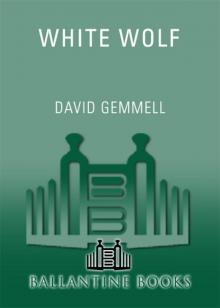 White Wolf
White Wolf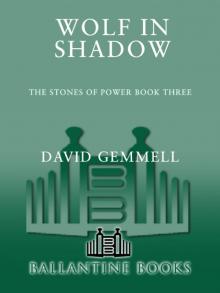 Wolf in Shadow
Wolf in Shadow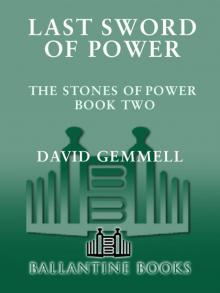 Last Sword of Power
Last Sword of Power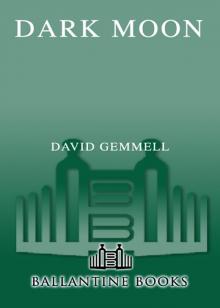 Dark Moon
Dark Moon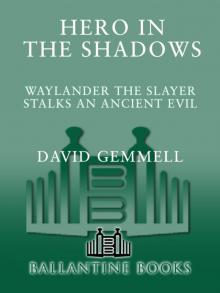 Hero in the Shadows
Hero in the Shadows Gemmell, David - Drenai 09 - Hero In The Shadows
Gemmell, David - Drenai 09 - Hero In The Shadows Waylander
Waylander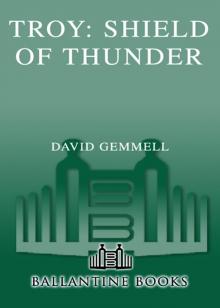 Shield of Thunder
Shield of Thunder Stormrider Stormrider
Stormrider Stormrider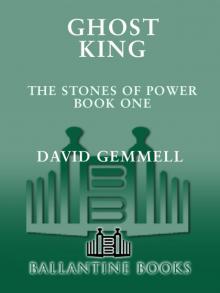 Ghost King
Ghost King Legend
Legend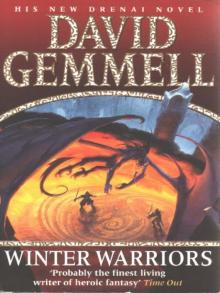 Winter Warriors
Winter Warriors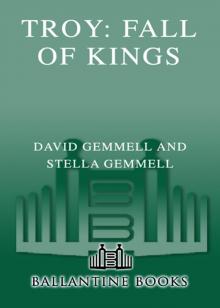 Fall of Kings
Fall of Kings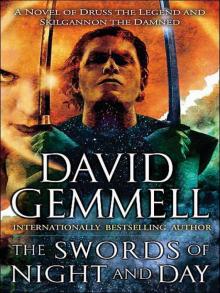 The Swords of Night and Day
The Swords of Night and Day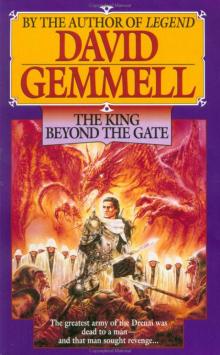 The King Beyond the Gate
The King Beyond the Gate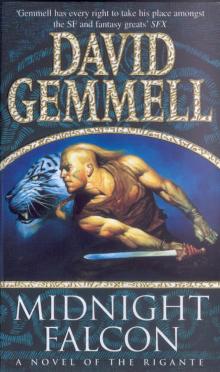 Midnight Falcon
Midnight Falcon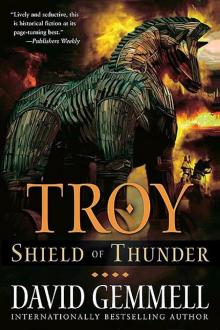 02 - Shield of Thunder
02 - Shield of Thunder In the Realm of the Wolf
In the Realm of the Wolf Ravenheart
Ravenheart The First Chronicles of Druss the Legend
The First Chronicles of Druss the Legend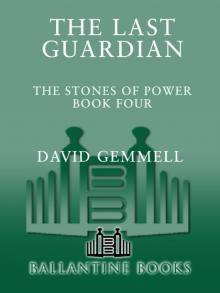 Last Guardian
Last Guardian Stormrider
Stormrider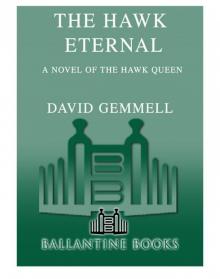 The Hawk Eternal
The Hawk Eternal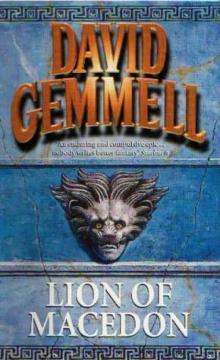 Lion of Macedon
Lion of Macedon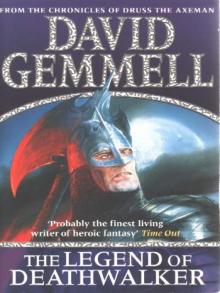 The Legend of Deathwalker
The Legend of Deathwalker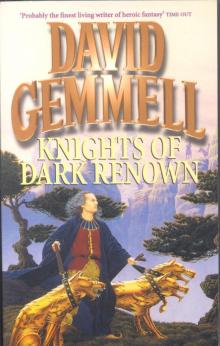 Knights of Dark Renown
Knights of Dark Renown Echoes of the Great Song
Echoes of the Great Song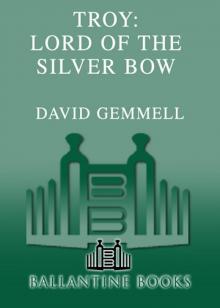 Lord of the Silver Bow
Lord of the Silver Bow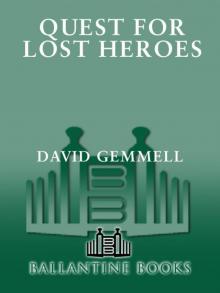 Quest for Lost Heroes
Quest for Lost Heroes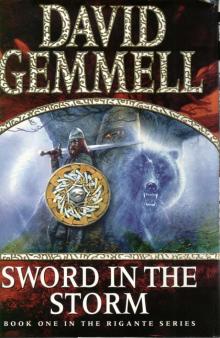 Sword in the Storm
Sword in the Storm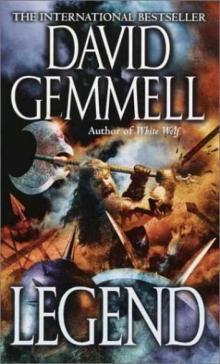 Drenai Saga 01 - Legend
Drenai Saga 01 - Legend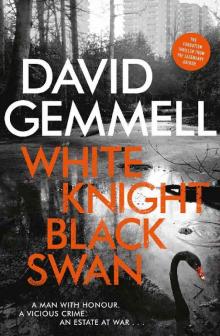 White Knight/Black Swan
White Knight/Black Swan![[Troy 02] - Shield of Thunder Read online](http://i1.bookreadfree.com/i/03/19/troy_02_-_shield_of_thunder_preview.jpg) [Troy 02] - Shield of Thunder
[Troy 02] - Shield of Thunder Lord of the Silver Bow t-1
Lord of the Silver Bow t-1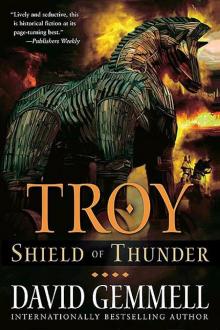 Shield of Thunder t-2
Shield of Thunder t-2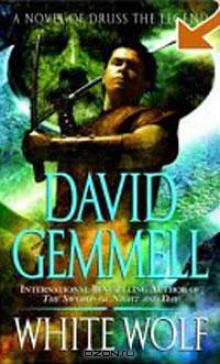 White Wolf: A Novel of Druss the Legend dt-10
White Wolf: A Novel of Druss the Legend dt-10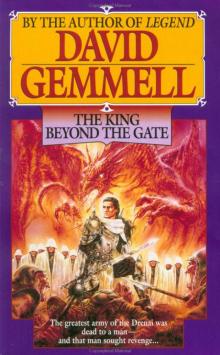 Drenai Saga 02 - The King Beyond the Gate
Drenai Saga 02 - The King Beyond the Gate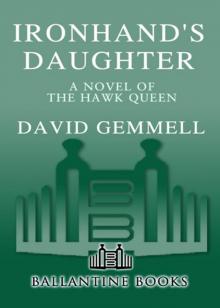 Ironhand's Daughter
Ironhand's Daughter Gemmell, David - Drenai 06 - The First Chronicles of Druss the Legend
Gemmell, David - Drenai 06 - The First Chronicles of Druss the Legend The Last Guardian
The Last Guardian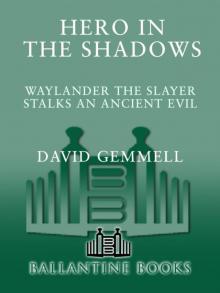 Hero in the Shadows: A Waylander the Slayer Novel
Hero in the Shadows: A Waylander the Slayer Novel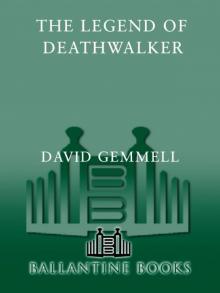 The Legend of the Deathwalker
The Legend of the Deathwalker